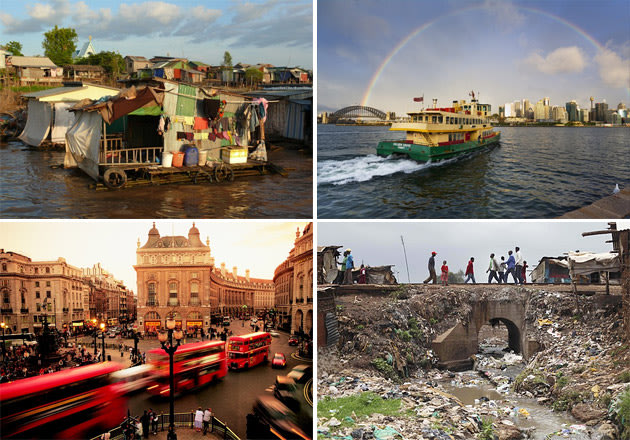
What is happiness? Charles Schulz, the creator of Peanuts, wrote, “Happiness is a warm puppy.” John Lennon had a different take: “Happiness is a warm gun.”
Whatever happiness is to you, there’s some conditions under which it most readily blossoms. You need enough money to acquire a puppy or a gun, and enough free time to exalt in its warmth. You need the peace of mind that Big Brother isn’t about to come around the corner and take your gun (or puppy) away from you. And because fun things are even more fun when shared with others, you’ll be even happier if you have a family that encourages your passion, or at least a local chapter of the NRA or Kennel Club to hang out with.
The World’s Happiest Countries
A few years ago the directors of the Legatum Institute (part of billionaire Christopher Chandler‘sDubai-based Legatum Group) were thinking about the wealth of nations. “We found ourselves asking two questions,” says spokesman Julian Knapp. “First, why have some nations — given a similar start — become more successful and wealthier than others? And having recognized that life is about more than simple material satisfaction, the second question: why are some nations happier and more satisfied than others?” Indeed why had Ghana and South Korean, having shared similar GDP’s in the 1950s, gone in such different directions, with Korea’s now $39,000 per capita and Ghana’s just $3,000.
After studying 40 years of data and outcomes, they settled on eight areas – the ingredients of prosperity: economy, entrepreneurship, governance, education, health, safety, personal freedom andsocial capital. Then they looked for reliable data from the likes of the Gallup polling organization that would let them rank countries on their performance in these areas. Add up the scores and you get the Legatum Prosperity Index.
In its recently released 2011 index, billed as an “inquiry into global wealth and well being,” Legatum ranks 110 countries on their overall level of prosperity. These countries comprise 93% of global population and 97% of GDP.
At No. 1 for the third year in a row: Norway. What’s it got that the rest of the world doesn’t? For one thing, a stunning per capita GDP of $54,000 a year. Norwegians have the second-highest level of satisfaction with their standards of living: 95% say they are satisfied with the freedom to choose the direction of their lives; an unparalleled 74% say other people can be trusted.
Cynics say Norway’s ranking is a fluke, that it’s a boring, godless (just 13% go to church), homogeneous place to live, with a massive welfare state bankrolled by high taxes. Without massive offshore reserves of oil and gas that it exports to the world through state-controlled Statoil, Norway’s GDP would be far smaller.
Natural resources help: Australia, which ranks third, is benefitting greatly from selling its coal, iron and natural gas to China. And yet some of the most resource-reliant nations, like Kuwait and the United Arab Emirates, are far down the list. There’s clearly more to it than oil and ore. JoiningNorway and Australia in the top 10 are their neighbors Denmark, Finland, Sweden and New Zealand. Equally small and civilized Switzerland and the Netherlands are also up there. Rounding out the top 10 is the United States at 10th and Canada (sixth).
What do these nations have in common? They are electoral democracies, for one. People are naturally happier when they feel like they have a say in how their countries are run. They also have abundant civil liberties (consider decriminalized drugs and prostitution in the Netherlands), though if your happiness is a warm gun you’ll be happier in the U.S. than in Europe. There are few restrictions on the flow of capital or of labor. Legatum’s scholars point out that Denmark (No. 2), for example, has little job protection, but generous unemployment benefits. So business owners can keep the right number of workers, while workers can have a safety net while they muck around looking for that fulfilling job.
Legatum’s researchers note that Australia’s rise from fifth in 2009 to third place exemplifies these positive traits. The Aussies have abolished trade protections, freed labor markets, reformed strict immigration laws and become one of the world’s most flexible economies.
Of perhaps utmost importance, nearly all the nations in the top 10 are adept at fostering entrepreneurship and opportunity. Legatum’s researchers concluded that a country’s ranking in this area is the clearest proxy of its overall ranking in the index. This means low business startup costs, lots of cellphones, plenty of secure Internet servers, a history of high R&D spending and the perception that working hard gets you ahead. The U.S. stands out with a fifth-place rank in entrepreneurism and first place in health, thanks to the world’s highest level of health spending, great vaccination levels, clean water, plentiful food and beautiful scenery.
It’s worth noting that there are some countries plagued by autocrats or natural disasters that don’t show up on the list. Burma, Cuba and North Korea don’t allow pollsters in to survey citizens. Other restive countries where sufficient data was unavailable are Libya, Iraq, Afghanistan, Somalia andHaiti.
Perhaps the biggest disappointment in the three years of the Legatum Index is India. Since 2009 it has dropped 13 spots to 91st place. Per capita GDP is low at $3,600. Health care is extremely poor with high malnourishment and infant mortality and low vaccination rates. It lags in education with a literacy rate of 64%. In social capital, India ranks 104th; only 60% say they can rely on family or friends in a time of need. Only 21% find other people trustworthy. Social inequality perpetuated by a caste system means low levels of entrepreneurship and opportunity.
India might well wish it had Europe’s problems. Yet although Europe holds 14 of the top 20 slots in the index, not all is peachy. Ireland and Belgium have sagged two spots in the rankings since 2009;Italy and Greece are down four spots. Citizens in a number of European countries expressed flagging confidence in their governments as parliamentary power over economic decisions has been ceded toBrussels. Legatum’s researchers also noted surprise at a drop in personal freedom rankings in Finland and Sweden, which show slightly less tolerance for immigrants and minorities. Expect worse results for Europe next year.
It’s important to note that prosperity/happiness is not a zero-sum game; every country can improve simultaneously. Legatum notes that during the past three years scores have increased for 87 of 110 countries even if their overall ranking hasn’t risen at all. For instance, the more cell phones and Internet connectivity a country has the more opportunities they have to create networks. According to Legatum’s report, we all get more out of Facebook and Twitter than we realize: “Social networks are an asset that produces economic and wellbeing returns.”
For the most beleaguered countries, every little bit matters. An extra thousand dollars a year of income might not mean a lot to a Norwegian, but in the Central African Republic, where the average person gets by on $2 a day, it’s huge. Happiness there isn’t a puppy or a warm gun, it’s not having to bury your newborn before his first birthday.
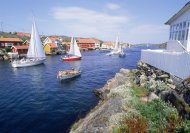 5) SwedenHigh levels of political participation and social equality combine with environmental protection and 123 mobile phones per 100 people to create a tech-savvy socialist paradise.
5) SwedenHigh levels of political participation and social equality combine with environmental protection and 123 mobile phones per 100 people to create a tech-savvy socialist paradise.
4) New Zealand
New Zealand ranks no. 2 in governance, education and personal freedom. No country ranks higher in tolerance for immigrants. (Image of artist Grand Hughes, Napier, N.Z.).
3) Australia
Australia has moved up from fifth place in 2009, the result of excellent education, an efficient government bureaucracy and booming trade in natural resources.
2) Denmark
Denmark is no. 2 for the third year. The tiny country ranks first in entrepreneurship and opportunity, based on high levels of social equality, high connectivity and the world's lowest start-up costs.
1) Norway
For the third year, Norway ranked no. 1. With per capita GDP of $54,000 it is among the richest in the world and ranks first in social capital and second in safety and security.
The 5 saddest countries:
5) Yemen
Civil unrest, few liberties, little education for girls. Only a third report any form of employment.
4) Pakistan
Ineffective, unstable government. Very dangerous, intolerant of outsiders.
3) Ethiopia
Literacy is just 30%; undernourishment 40%; unemployment rate 20%.
2) Zimbabwe
Inept, corrupt, kleptocracy. No civil rights. Pervasive political violence.
1) Central African Republic
The worst. More than 10% of children die in their first year. Classes average 91 students per teacher. No foundation for future growth.
Whatever happiness is to you, there’s some conditions under which it most readily blossoms. You need enough money to acquire a puppy or a gun, and enough free time to exalt in its warmth. You need the peace of mind that Big Brother isn’t about to come around the corner and take your gun (or puppy) away from you. And because fun things are even more fun when shared with others, you’ll be even happier if you have a family that encourages your passion, or at least a local chapter of the NRA or Kennel Club to hang out with.
The World’s Happiest Countries
A few years ago the directors of the Legatum Institute (part of billionaire Christopher Chandler‘sDubai-based Legatum Group) were thinking about the wealth of nations. “We found ourselves asking two questions,” says spokesman Julian Knapp. “First, why have some nations — given a similar start — become more successful and wealthier than others? And having recognized that life is about more than simple material satisfaction, the second question: why are some nations happier and more satisfied than others?” Indeed why had Ghana and South Korean, having shared similar GDP’s in the 1950s, gone in such different directions, with Korea’s now $39,000 per capita and Ghana’s just $3,000.
After studying 40 years of data and outcomes, they settled on eight areas – the ingredients of prosperity: economy, entrepreneurship, governance, education, health, safety, personal freedom andsocial capital. Then they looked for reliable data from the likes of the Gallup polling organization that would let them rank countries on their performance in these areas. Add up the scores and you get the Legatum Prosperity Index.
In its recently released 2011 index, billed as an “inquiry into global wealth and well being,” Legatum ranks 110 countries on their overall level of prosperity. These countries comprise 93% of global population and 97% of GDP.
At No. 1 for the third year in a row: Norway. What’s it got that the rest of the world doesn’t? For one thing, a stunning per capita GDP of $54,000 a year. Norwegians have the second-highest level of satisfaction with their standards of living: 95% say they are satisfied with the freedom to choose the direction of their lives; an unparalleled 74% say other people can be trusted.
Cynics say Norway’s ranking is a fluke, that it’s a boring, godless (just 13% go to church), homogeneous place to live, with a massive welfare state bankrolled by high taxes. Without massive offshore reserves of oil and gas that it exports to the world through state-controlled Statoil, Norway’s GDP would be far smaller.
Natural resources help: Australia, which ranks third, is benefitting greatly from selling its coal, iron and natural gas to China. And yet some of the most resource-reliant nations, like Kuwait and the United Arab Emirates, are far down the list. There’s clearly more to it than oil and ore. JoiningNorway and Australia in the top 10 are their neighbors Denmark, Finland, Sweden and New Zealand. Equally small and civilized Switzerland and the Netherlands are also up there. Rounding out the top 10 is the United States at 10th and Canada (sixth).
What do these nations have in common? They are electoral democracies, for one. People are naturally happier when they feel like they have a say in how their countries are run. They also have abundant civil liberties (consider decriminalized drugs and prostitution in the Netherlands), though if your happiness is a warm gun you’ll be happier in the U.S. than in Europe. There are few restrictions on the flow of capital or of labor. Legatum’s scholars point out that Denmark (No. 2), for example, has little job protection, but generous unemployment benefits. So business owners can keep the right number of workers, while workers can have a safety net while they muck around looking for that fulfilling job.
Legatum’s researchers note that Australia’s rise from fifth in 2009 to third place exemplifies these positive traits. The Aussies have abolished trade protections, freed labor markets, reformed strict immigration laws and become one of the world’s most flexible economies.
Of perhaps utmost importance, nearly all the nations in the top 10 are adept at fostering entrepreneurship and opportunity. Legatum’s researchers concluded that a country’s ranking in this area is the clearest proxy of its overall ranking in the index. This means low business startup costs, lots of cellphones, plenty of secure Internet servers, a history of high R&D spending and the perception that working hard gets you ahead. The U.S. stands out with a fifth-place rank in entrepreneurism and first place in health, thanks to the world’s highest level of health spending, great vaccination levels, clean water, plentiful food and beautiful scenery.
It’s worth noting that there are some countries plagued by autocrats or natural disasters that don’t show up on the list. Burma, Cuba and North Korea don’t allow pollsters in to survey citizens. Other restive countries where sufficient data was unavailable are Libya, Iraq, Afghanistan, Somalia andHaiti.
Perhaps the biggest disappointment in the three years of the Legatum Index is India. Since 2009 it has dropped 13 spots to 91st place. Per capita GDP is low at $3,600. Health care is extremely poor with high malnourishment and infant mortality and low vaccination rates. It lags in education with a literacy rate of 64%. In social capital, India ranks 104th; only 60% say they can rely on family or friends in a time of need. Only 21% find other people trustworthy. Social inequality perpetuated by a caste system means low levels of entrepreneurship and opportunity.
India might well wish it had Europe’s problems. Yet although Europe holds 14 of the top 20 slots in the index, not all is peachy. Ireland and Belgium have sagged two spots in the rankings since 2009;Italy and Greece are down four spots. Citizens in a number of European countries expressed flagging confidence in their governments as parliamentary power over economic decisions has been ceded toBrussels. Legatum’s researchers also noted surprise at a drop in personal freedom rankings in Finland and Sweden, which show slightly less tolerance for immigrants and minorities. Expect worse results for Europe next year.
It’s important to note that prosperity/happiness is not a zero-sum game; every country can improve simultaneously. Legatum notes that during the past three years scores have increased for 87 of 110 countries even if their overall ranking hasn’t risen at all. For instance, the more cell phones and Internet connectivity a country has the more opportunities they have to create networks. According to Legatum’s report, we all get more out of Facebook and Twitter than we realize: “Social networks are an asset that produces economic and wellbeing returns.”
For the most beleaguered countries, every little bit matters. An extra thousand dollars a year of income might not mean a lot to a Norwegian, but in the Central African Republic, where the average person gets by on $2 a day, it’s huge. Happiness there isn’t a puppy or a warm gun, it’s not having to bury your newborn before his first birthday.
Click the next page to see the 5 happiest and 5 unhappiest countries.
The 5 happiest countries:

Sweden (Photo courtesy of Chad Ehlers Stock Connection Worldwide/Newscom)
4) New Zealand
New Zealand ranks no. 2 in governance, education and personal freedom. No country ranks higher in tolerance for immigrants. (Image of artist Grand Hughes, Napier, N.Z.).
3) Australia
Australia has moved up from fifth place in 2009, the result of excellent education, an efficient government bureaucracy and booming trade in natural resources.
2) Denmark
Denmark is no. 2 for the third year. The tiny country ranks first in entrepreneurship and opportunity, based on high levels of social equality, high connectivity and the world's lowest start-up costs.
1) Norway
For the third year, Norway ranked no. 1. With per capita GDP of $54,000 it is among the richest in the world and ranks first in social capital and second in safety and security.
The 5 saddest countries:
5) Yemen
Civil unrest, few liberties, little education for girls. Only a third report any form of employment.
4) Pakistan
Ineffective, unstable government. Very dangerous, intolerant of outsiders.
3) Ethiopia
Literacy is just 30%; undernourishment 40%; unemployment rate 20%.
2) Zimbabwe
Inept, corrupt, kleptocracy. No civil rights. Pervasive political violence.
1) Central African Republic
The worst. More than 10% of children die in their first year. Classes average 91 students per teacher. No foundation for future growth.

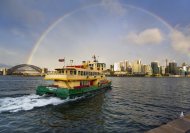



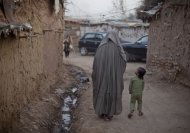
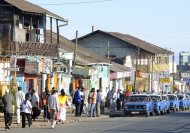






No comments:
Post a Comment